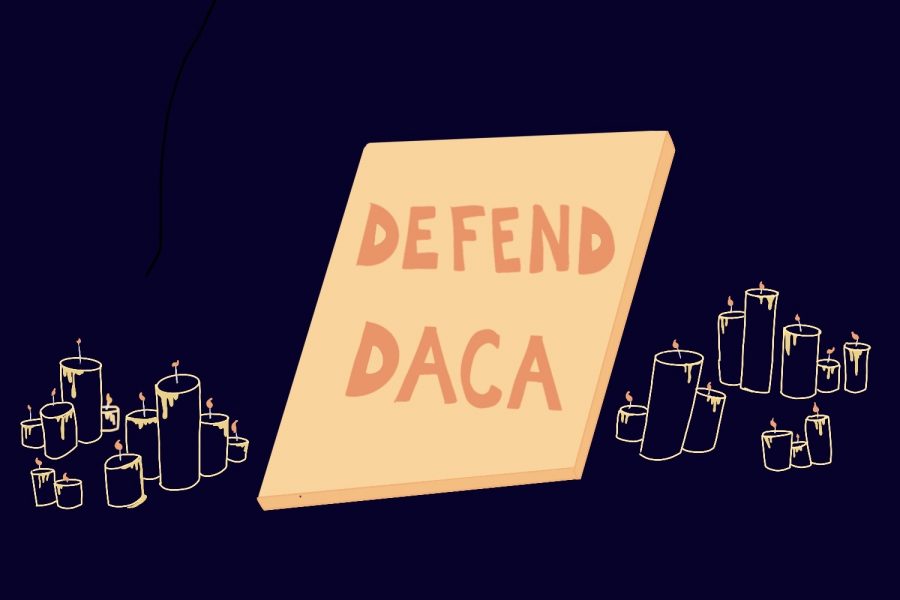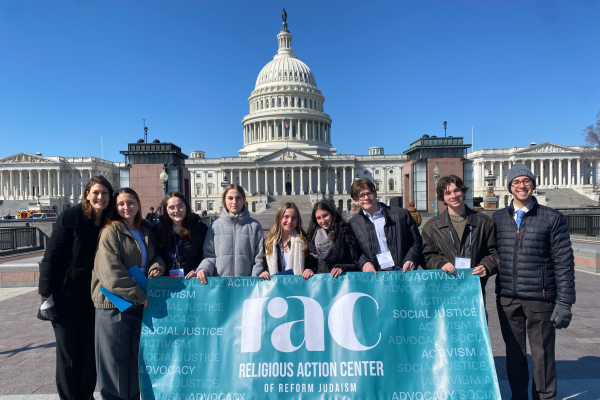Column: The immigration crisis is not just topic for political discussion
Photo credit: Leslie Casataneda
An artistic illustration by senior Leslie Castaneda. The illustration features a poster with the words “Defend DACA,” similar to the posters protestors have been holding up outside the White House. The illustration also has 22 candles like the ones used in the El Paso memorials. The candles commemorate the 22 lives lost.
I was mindlessly scrolling through Instagram on a typical summer afternoon when I found out about the mass shooting in El Paso, Texas.
In the past year alone, I had heard about countless tragedies like this one. Oscar Martinez Ramirez and his 23-month-old daughter Angie Valeria were found dead while crossing the border by river, and migrant children like Jakelin Caal Maquin and Felipe Alonzo-Gomez died while in detention centers, so as I read Buzzfeed New’s post, I didn’t have much of a reaction. I had become so accustomed to hearing news like this. I was numb to it.
When we got back to school, Hermanas Unidas decided to have our first meeting of the year on the shooting. I had prepared my portion of the presentation not thinking much of it, but as I stood in front of the room full of students, it all came crashing down on me.
I didn’t know that I wasn’t ready to say it out loud. With every detail about the event, about the shooter, my voice broke a little more. My body shook a little more. Twenty-two people lost their lives. Twenty-five were injured. The case was being treated as domestic terrorism.
A minute into my next period class, I was sobbing uncontrollably.
I wept not only for the lives that were lost but also for all the families that were being separated. I wept for my family, for this country and for the fear that was paralyzing my community.
Three months later, that lump in my throat hasn’t gone away. Last month, the Supreme Court heard arguments for DACA, and although they haven’t yet reached a decision, I already feel defeated. It may sound overly pessimistic, but it is easy to see immigration in this country today as a lost cause. If you were to search “DACA” during the week of the hearings, you could only begin to understand what I’m feeling.
You would have seen see the New York Times’ “Supreme Court Appears Ready to Let Trump End DACA Program,” Politico’s “Don’t count on the Senate to save Dreamers from SCOTUS” or President Donald Trump calling DACA recipients “far from angels'” and “tough, hardened criminals” on Twitter.
Trump’s anti-immigrant rhetoric is what got him media attention during his presidential campaign. From his announcement speech in 2015 where he said, “When Mexico sends its people, they’re not sending their best…They’re bringing drugs. They’re bringing crime. They’re rapists” to his infamous promise to build a wall at the southern border, Trump brought the anti-immigrant agenda to the national political stage. When he took office, Trump not only continued to vilify immigrants, but he also made this sentiment systematic.
For example, there was a drastic shift in which immigrants are targeted. Former President Barack Obama deported more immigrants than any other president, but he prioritized the deportation of immigrants with criminal records.
Days after entering office, Trump signed immigration executive orders that stated, “We cannot faithfully execute the immigration laws of the United States if we exempt classes or categories of removable aliens from potential enforcement. The purpose of this order is to direct executive departments and agencies to employ all lawful means to enforce the immigration laws of the United States.”
Shortly after, his administration issued the zero-tolerance policy to deter illegal immigration and encourage stricter legislation. The policy demanded the prosecution of all individuals who illegally entered the United States. Nearly 3,000 children were separated from their families. Two months later, Trump signed an executive order stating that family separation would be halted, but the “zero-tolerance” policy would continue.
This change in immigration policy quickly showed in the U.S. Immigration and Customs Enforcement [ICE] Enforcement and Removal Operations report. After Trump’s first fiscal year in office, ICE made 110,568 arrests—a 42% increase over the 77,806 arrests made during the same period in 2016.
The report also showed that when Trump came into office, there was an increase in interior deportations. Interior deportations usually involve people who have lived in the U.S. for an extended period of time, have established roots in the U.S. and/or have family here. These deportations are different from border deportations, which are deportations that happen shortly after an illegal crossing to the U.S. There were 61,094 ICE interior removals during Trump’s first year, significantly higher than 44,512 from the previous year.
Unfortunately, these are not the only ways immigration enforcement is changing. This summer, U.S. Representative Alexandria Ocasio-Cortez testified before the House Oversight committee after a visit to the border. Cortez gave an impassioned and heartbreaking testimony where she called the crisis at the border a “manufactured crisis.” She recalled the terrible conditions of the facilities, the mistreatment from officers and what migrants in the cells told her.
Just this September, the Trump administration slashed the American refugee program by almost half, significantly limiting the number of people fleeing war and persecution from who can resettle in the U.S. The administration will accept no more than 18,000 refugees in the next twelve months, down from Trump’s previous limit of 30,000. This is a lot lower than the 110,000 President Barack Obama said should be allowed into the United States during his final year in office.
The immigration crisis has rapidly become an institutionalized act of discrimination. It has manifested into a racially charged political discussion. Minutes before the El Paso shooting, for example, the gunman posted a four-page anti-immigrant manifesto. During his first police interview, he said that he drove 10 hours to the location and was targeting “Mexicans.” The gunman has also been found to have been deeply influenced by President Trump.
In the manifesto, the gunman said he supported the actions of the gunman who killed 51 people at two mosques in Christchurch, New Zealand earlier this year. This seems to be a common theme. White extremist ideology that drives deadly shootings is on the rise.
There is a dangerous anti-immigrant mentality brewing in the U.S. Innocent migrants are being arrested and losing everything. Children are being separated from their families. People are being put in inhumane conditions. More and more people are losing their lives.
In a time when you can easily just turn off the news, in a time where our very own president dehumanizes this group of people with cruel language, it has become way too easy to ignore or become desensitized to the issue. I want people to understand that we aren’t just talking about the latest news story or numbers on a page, we are talking about death, racism, separation, trauma — a serious crisis.
We forget that these people are not just migrants, they are not just a topic of political discussion. They are real people living in real fear.

Celeste Ramirez joined the Oracle as a columnist in 2017 and is now the Multimedia Editor. Her column focuses on diversity at Archer, highlighting the...













